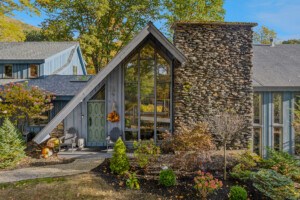Is Your Dream Home in the Cards This Year?
Want to know what’s going to happen in the region’s most outrageous home market? We asked local property experts to peer into the future and offer a dozen compelling predictions that’ll help you navigate Boston’s wild world of buying and selling.

Photo illustration by C.J. Burton and Mark Matcho
Real Estate Prediction #1: Prices will continue to climb, but not so darn quickly.
When it comes to the area’s sky-high real estate prices, “We’re in extra innings right now,” says Dana Bull, of the North Shore’s Sagan Harborside Sotheby’s International Realty. “It doesn’t make any sense how it continues to go at the rate it’s going.” That said, buyers have started to pump the brakes, and Bull predicts that will continue into the foreseeable future. Across Greater Boston last year, the median price of a single-family home increased only half as much as the previous year—a phenomenon Sagan agent Matthew Dolan attributes to house hunters tiring of bidding wars that drive prices over asking. “At some point over the last year, buyers just said, ‘Hey guys, you’re trying to get too much money now, and we don’t see [the value],’” he says. “‘We’re here, we’re ready to buy, but you guys are taking it too far.’” If nothing else, 2020 may be the year buyers can have at least 24 hours to put in their offer before their dream home gets snapped up.
Real Estate Prediction #2: Millennials and boomers will continue to battle for the same homes in the suburbs—and the city.
Once upon a time, empty nesters dutifully packed up their spacious two-story Colonials in Wellesley and flocked to cozier digs, freeing up their homes for families with kids who hadn’t yet flown away, and everyone lived happily ever after. These days, though, the classic intergenerational housing swap is hitting a few roadblocks. For one, people ages 55 to 75 simply aren’t retiring at predicted rates—and as they hold onto their jobs, they’re holding onto their homes, leading to what Bull calls a “middle-market housing crunch” in the ’burbs. But boomers aren’t the only wrench in the system. Golden-agers who do decide to give up their sprawling house for a dream condo in the South End may find themselves in a bidding war, thanks to first-time buyers who’ve decided to settle in Boston rather than search for greener pastures. “They’re looking for the same thing,” Bull says, “but for different reasons.” Parents and children may not see eye to eye on everything, but if we’re going to see any relief for Boston’s housing crunch in the next decade, they’ll have to make some compromises on where they live, and when.

Photo illustration by C.J. Burton and Mark Matcho
Real Estate Prediction #3: Residential construction in Boston will slow down.
The familiar din of jackhammers that’s served as the city’s soundtrack over the past decade may soon change its tune to something a bit quieter. City data shows that new-housing-construction permits were down nearly 25 percent in 2019—though with many permits already granted and projects under way, pedestrians may not observe a development drop-off for a little while. So what’s causing the building boom’s downward trend? Rising land prices, coupled with calls on Beacon Hill for a new luxury real estate tax and rent control, are just some of the factors scaring developers away from new residential projects. “The markets hate uncertainty,” says Boylston Properties principal Andrew Copelotti, who’s currently developing 300 apartments at Watertown’s Arsenal Yards. “So the idea that legislation could be introduced that creates uncertainty for developers may be contributing to the slowing in the market.” Ultimately, a stifled flow of new inventory could drive up demand even higher and kick Boston housing prices into the stratosphere—which would end up being a good thing for building developers, but a bad thing for the rest of us.
Real Estate Prediction #4: Early inheritances will give young people a head start on homeownership.
Kids, keep your “Okay, boomer” retorts under your breath—your parents might just be your golden ticket to a home of your own. Desperate to give their brood a leg up in Greater Boston’s insanely expensive housing market, more and more local parents are quietly passing on their hard-earned money early—and experts predict the trend will only increase in the coming years, here and elsewhere: In fact, 65 percent of Americans 55 and over now believe it’s better to turn over some assets to their children ahead of time, according to a 2019 study by Merrill Lynch. “A lot of those families are saying, ‘Well, if I transfer the wealth of this family to the next generation sooner, it’ll allow them to buy sooner; it’ll allow them to get settled,’” says Compass regional president Jeffrey Heighton. “It’s driving first-time buyers to be able to not only buy, but be competitive.” Underlying this emerging practice is the belief that investing in real estate is still a reliable way to grow long-term wealth—not to mention a reliable way to convince your adult children to collect their junk from the basement.
Real Estate Prediction #5: The starter home will become a thing of the past.
Remember those new-construction suburban split-levels that young families once scraped together the money to buy? Yeah, neither do we. Thanks to the rising costs of materials and labor, “Developers can’t make the traditional starter home work for their margins anymore. So now they’re making things bigger and more intricate, and they’re targeting that luxury buyer,” Bull says. In many ways, though, that suits today’s first-time buyers just fine, as a cultural shift is once again changing the way things are done. “The [stereotypical] starter home just isn’t applicable anymore,” Bull says. “Rather than a couple with a young baby buying their first home together—there is no married couple; there is no baby yet.” She predicts we’ll see an increase in couples purchasing multifamilies as real estate investments, single women buying properties to rent out rooms to friends or significant others, and other less-traditional buying arrangements in the years ahead.

Photo illustration by C.J. Burton and Mark Matcho
Real Estate Prediction #6: Real estate agents will have to step up their game.
Think back to a time before the Internet: When you wanted to book a vacation, you visited a travel agency; when you needed a new pair of shoes, you went to the mall; and when you wanted to buy or sell a house, you hired a real estate agent. Well, a few things are different now, and the role of agents is increasingly one of them. “In years past, we had a book, and we were gatekeepers,” Dolan explains. “You had to call me, and I would look in the book, and I would tell you, ‘I’ve got something to show you.’” But with sites like Zillow and Realtor.com making listings searchable and sortable to anyone with an Internet connection—and even allowing savvy sellers to list their home themselves in a few clicks—the game has changed. “My role isn’t to find you a property faster than you can find it online,” Dolan says. “That race is dead. My role is about helping you understand what that property represents in terms of value, in terms of lifestyle, and in terms of negotiating strategy.” In an age when people want things done fast and virtually, Heighton says, agents also need to be willing to move beyond traditional tools of the trade—e.g., physical walk-throughs and paper contracts. “If we go back 10 years and certainly 20 years, nobody was negotiating properties over text message,” he says.
Real Estate Prediction #7: Luxury will get a new look.
Forget the headlines about millennials squandering their would-be savings on avocado toast: Experts say they’re eventually on track to become the richest generation in U.S. history, with some 618,000 millennial millionaires already living in the country today. What to do with all that money? Change the luxury game, Dolan says. “Millennials are focusing on experiences,” he explains, and “they view real estate as part of their entertainment feed. How their real estate appears is part of how they describe themselves to the world.” That means properties that reflect their style are more important to the next generation of luxury buyers than an abundance of square footage (so long, McMansions!). Another high-end feature that may soon fall out of fashion? Waterfront vistas. Sure, the unobstructed panoramas are beautiful, but Dolan says rising water levels have some buyers more interested in the home across the street—still with great sightlines.
Real Estate Prediction #8: Developments centered around public transportation will gain steam.
Working in Boston leaves most commuters with two choices: Live in the ’burbs and make the soul-crushing crawl through rush-hour traffic each day, or sacrifice far more than the recommended one-third of their paycheck each month to live within city limits. But a brighter option is on the horizon, and its name is transit-oriented development. Built within an easily walkable radius of train stations, these mixed-use complexes have begun luring city dwellers to the hinterlands with promises of quick commutes and shopping and dining right outside their door. “The infrastructure for getting to downtown Boston and other key areas is already here in Brockton,” says Geoffrey Anatole, a developer currently working on his second transit-oriented building in that city, which boasts four commuter-rail stations with service to Boston. After quickly filling up his first apartment complex, Anatole is confident that this second, more-upscale development, with two-bedrooms starting at about $1,900 a month, will be just as popular. And if the commuter rail gets on track for its proposed overhaul—a dream that includes electric cars running every 15 to 20 minutes—we can expect to see more buildings like this all over Greater Boston.

Photo illustration by C.J. Burton and Mark Matcho
Real Estate Prediction #9: Fixer-uppers will become less popular.
Despite what HGTV may lead you to believe, Bostonians are past peak interest in houses that need TLC. “What we’re seeing in most markets in the metropolitan [area] is that a finished home will sell faster, have more demand, and generally sell at a higher price” than the unrenovated equivalent, even after improvement costs are factored in, Heighton says. He cites two main factors for this shift: dollars and time. “A majority of the buyer pool would prefer to spend money at the purchase,” he says, to avoid the unknown costs of renovation. Second, rehabs require buyers—who are already overloaded with work and family life—to face the question of how many weeks or months the improvements will take and where they’ll stay in the meantime. A generational divide might also help explain the preference for already-renovated homes. “For boomers, their parents lived through the Great Depression, so they had much more of a thrift approach,” says Dolan of Sagan Harborside Sotheby’s. “People bought houses expecting to unlock value with a little sweat equity. Millennials want it done, they want it nice, they want it turnkey.” Whatever the reason, Heighton says the lack of interest in properties that need work is actually creating a niche opportunity for flippers trying to break into the tight market. “I tend to push people to look at an unrenovated home,” he says, “because I think there’s a lot of opportunity there.”

Photo illustration by C.J. Burton and Mark Matcho
Real Estate Prediction #10: Homeowners everywhere will renovate their kitchens.
If the kitchen is the first room you gravitate toward when walking into an open house, you’re in good company. Of the nearly 28,000 residential construction permits filed in Boston in 2018, 18 percent of those were for kitchen renovations, making it the most popular upgrade in the city, according to the home-improvement platform Kukun. It makes sense when you consider that kitchens “are the most valuable part of the equation of a home,” Heighton says. “People tend to spend more time and more money on the kitchen…since, generally speaking, a kitchen renovation offers the best return on their investment” when they decide to sell. While we’re likely to continue seeing more upgrades in 2020, the popular aesthetic is ripe for a change. At the turn of the millennium, kitchens with darker wood cabinets and countertops were in vogue, and for the past several years, it’s been all about the all-white look. But going forward, predicts New England Design Works’ Karen Swanson, kitchens are going to get more colorful. “Homeowners still want to make choices that stand the test of time, but the fear that the only color that can satisfy that is white seems to be dissipating,” she notes.
Real Estate Prediction #11: Co-living will thrive.
Just when you thought Boston couldn’t become any more of a college town, co-living developments have come to say hold my beer. Similar to dorms, these new buildings will soon be offering micro-studios and shared multi-bedroom apartments—not to mention a collection of amped-up community amenities—to Gen Zers and others looking for a comfortable, fun place to live that won’t break the bank. The South End’s forthcoming 7Ink complex, for example, will feature a movie-viewing area, coworking spaces, and a communal kitchen when it opens this year, while the co-living company Common will touch down in Allston in 2022 with 278 units, multiple lounges, and more than 5,000 square feet of green space. With Boston consistently ranking behind only San Francisco and New York (two other hubs where co-living has found a strong foothold) for highest rents, it’s easy to see why developers are increasingly bringing these buildings to the market. As for the tenants, the benefit is clear: “There is no doubt that housing affordability is an issue in Boston, and I see co-living continuing to expand as one of multiple ways to tackle this larger problem,” says Brian Lee, senior director of real estate at Common. Besides, with nearly a quarter of adults in the U.S. reporting loneliness, socially oriented housing might be just what the doctor ordered.
Real Estate Prediction #12: “Hipsturbias” will continue to multiply.
Trendy indie shops, kid-friendly breweries, and walkable downtowns? Lately, more and more suburban spots are becoming suspiciously cool (see: the newly happening scenes in towns like Salem and Hudson). Coined by the Urban Land Institute, the term “hipsturbia” is more than just a cute portmanteau: Inspired by the “live/work/play” concept that revitalized cities in the ’90s, it’s a trend that’s changing the way people live outside the urban core—especially in Greater Boston, where real estate prices continue to push first-time buyers beyond 128. Now that they’ve planted their flag, Bull says, these new residents are driving demand for—and in some cases creating—a host of, well, hip gathering places that make the fringes a fun place to be. In other words, she explains, “Millennials may see the benefits of the suburbs, but they’re not willing to give up on city living.”


